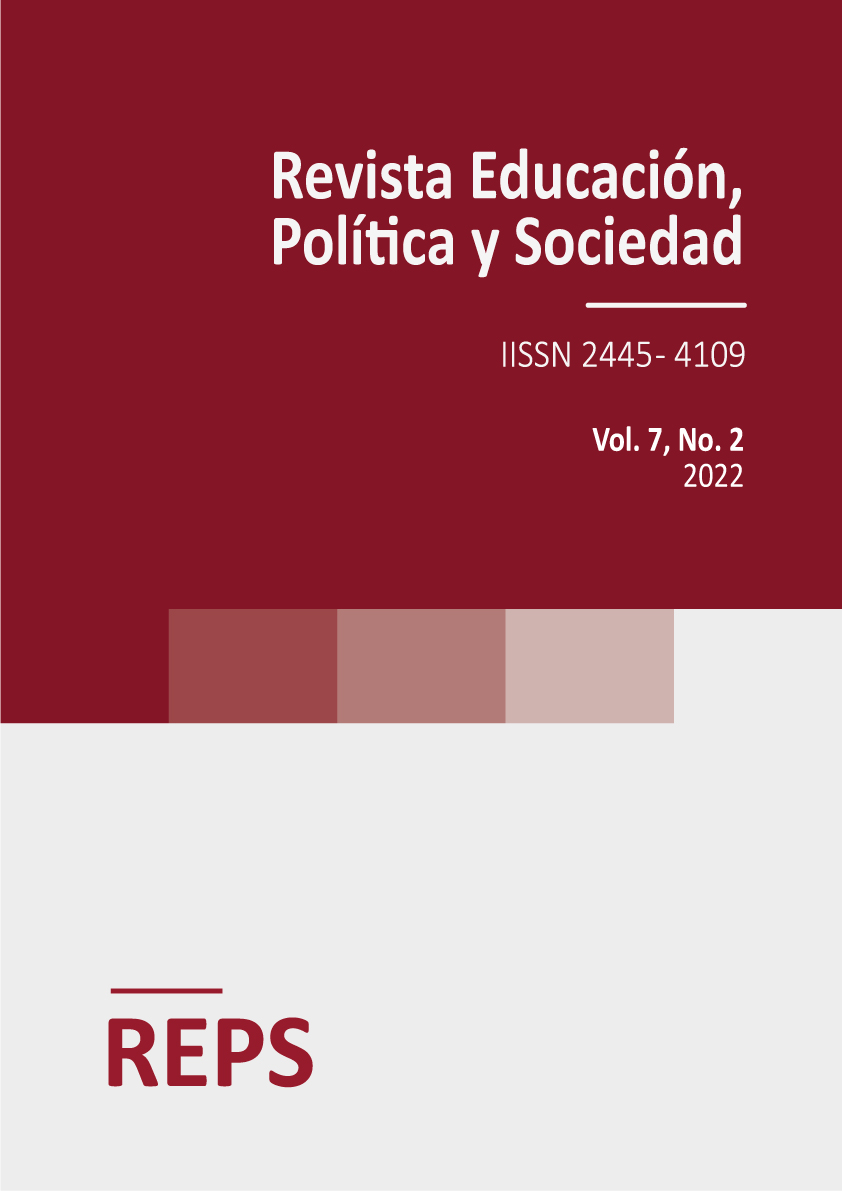Governing words. About the right to education in the Free School Choice Law in Madrid region
Keywords:
School choice, right to education, endo-privatization in education, individualization
This work is licensed under a Creative Commons Attribution-NonCommercial 4.0 International License.
Abstract
Since 2005, Madrid region has promoted school choice through a deep reform of its educational system. The enactment of Ley Maestra de Libertad de Elección Educativa (Free School Choice Act) represents a new step in the privatization process followed by the regional educational system. The analysis of the textual and discursive structure of the Act reveals the re-definition of the right to education throughout two routes: the privatization of the policy-making process through its employment to answer policy makers interests; and the privatization of the concept of education through its reduction to freedom of choice.
Downloads
References
Apple, M.W. (2006). Educating the ‘Right’ Way: Markets, Standards, God, and Inequality. Nueva York y Londres: Routledge.
Ball, S. (1990). Politics and policy making in education. Exploration in policy sociology. Nueva York y Londres Routledge.
Ball, S. (1994). Education reform. A critical and post-structural approach. Buckingham y Philadelphia: Open University Press.
Ball, S. J. (1993). What is policy? Texts, trajectories and toolboxes. Discourse: Studies in the Cultural Politics of Education, 13 (2), 10-17.
Barbehön, M., Münch, S. y Lamping, W. (2015). Problem definition and agenda-setting in critical perspective. En F. Fischer, D. Torgerson, A. Durnová y M. Orsini (Eds.), Handbook of Critical Policy Studies (241-258). Massachusetts: Edward Elgar Publishing.
Boletín Oficial de la Asamblea de Madrid. XII, 15, 14 de octubre de 2021.
Consejería de Educación. (2020). Madrid, Comunidad Bilingüe 2019-2020. Dirección General de Bilingüismo y Calidad de la Enseñanza.
Constitución Española. Boletín Oficial del Estado, núm. 311, de 29 de diciembre de 1978.
De Castro, R.M. (2014). La enseñanza bilingüe en Madrid. Tarbiya. Revista de Investigación e Innovación educativa, 43, 197-209.
Diario de sesiones de la Asamblea de Madrid. Legislatura XII, 2, 17 y 18 de junio de 2021.
Diario de sesiones de la Asamblea de Madrid. Legislatura XII, 52, 7 de octubre de 2021.
Díaz Revorio, F. J. (1998). El derecho a la educación. Anuario Parlamento y Constitución, 2, 267-308.
Jessop, B. (2010). Cultural political economy and critical policy studies. Critical Policy Studies, 3 (3-4), 336-356.
Levin, H. (2001). Privatizing education. Can the school marketplace deliver Choice, Efficiency, Equity, and Social Cohesion? Nueva York: Taylor & Francis.
Ley 1/2022, de 10 de febrero, Maestra de Libertad de Elección Educativa de la Comunidad de Madrid. Boletín Oficial de la Comunidad de Madrid, núm. 28, de 15 de febrero de 2022.
Lubienski, C. (2006). School choice and privatization in education: An alternative analytical framework. Journal for Critical Education Policy Studies, 4 (1), 1–26.
Lubienski, C. (2013). Privatising form or function? Equity, outcomes and influence in American charter schools. Oxford Review of Education, 39 (4), 498-513.
Malin, J.R., Potterton, A.U. y Lubienski, C. (2021) Language Matters: K–12 Choice-Favoring and Public-Favoring Stories. Kappa Delta Pi Record, 57 (3), 104-109.
Martínez de Pisón, J. (2003). El derecho a la educación y la libertad de enseñanza. Madrid: Dykinson.
McCowan, T. (2010). Reframing the universal right to education. Comparative Education, 46 (4), 509-525.
Murillo, J., Almazán, A. y Martínez-Garrido, C. (2021). La elección de centro educativo en un sistema de cuasi-mercado escolar mediado por el programa de bilingüismo. Revista Complutense de Educación, 32 (1), 89-97.
Pagès, M. y Prieto, M. (2020). The instrumentation of global education reforms: an analysis of school autonomy with accountability policies in Spanish education. Educational Review, 72 (6), 671-690.
Prieto, M. y Villamor, P. (2012). Libertad de elección, competencia y calidad: las políticas educativas de la Comunidad de Madrid. Profesorado. Revista de Currículum y Formación de Profesorado, 16 (3),149-166.
Prieto, M. y Villamor, P. (2018). El Impacto de una reforma: Limitación de la autonomía, estrechamiento de la libertad y erosión de la participación. Archivos Analíticos de Políticas Educativas, 26 (63). http://dx.doi.org/10.14507/epaa.26.3255
Puelles Benítez, M. (2004). Política y Educación en la España Contemporánea. Madrid: UNED.
Puelles Benítez, M. (2017). Política, legislación y educación. UNED.
Rodríguez Fernández, J. R. (2018). El análisis político del discurso: apropiaciones en educación. Barcelona: Octaedro.
Ruiz, R.G. (2020). El derecho a la educación: definiciones, normativas y políticas públicas revisadas. Buenos Aires: Eudeba.
Scioscioli, S. (2014). El derecho a la educación como derecho fundamental y sus alcances en el derecho internacional de los derechos humanos. Journal of Supranational Policies of Education, 2, 6-24.
Tomasevski, K. (2001). Human rights obligations: making education available, accessible, acceptable and adaptable. Swedish International Development Cooperation Agency.
UNESCO. (2021). Non-state actors in education. Who chooses? Who loses? Global Education Monitoring Report 2021/22. UNESCO.
Verger, A., Prieto, M., Pagès, M. y Villamor, P. (2020). Common standards, different stakes: A comparative and multi-scalar analysis of accountability reforms in the Spanish education context. European Educational Research Journal, 19 (2), 142-164.
Viñao, A. (2018). Los orígenes del debate. Liberalismo, Estado, educación e Iglesia (1813-1936). En M. Menor y M.D. Puelles (Coords.), El artículo 27 de la Constitución: cuaderno de quejas (pp. 36-59). Madrid: Morata.

